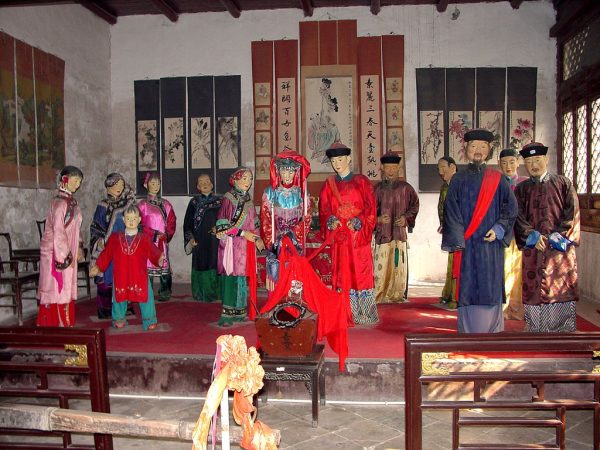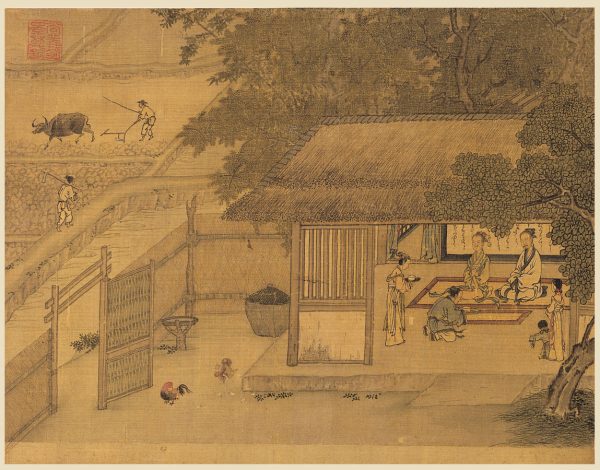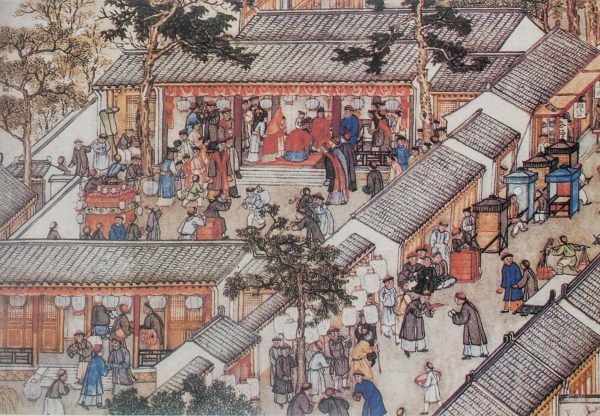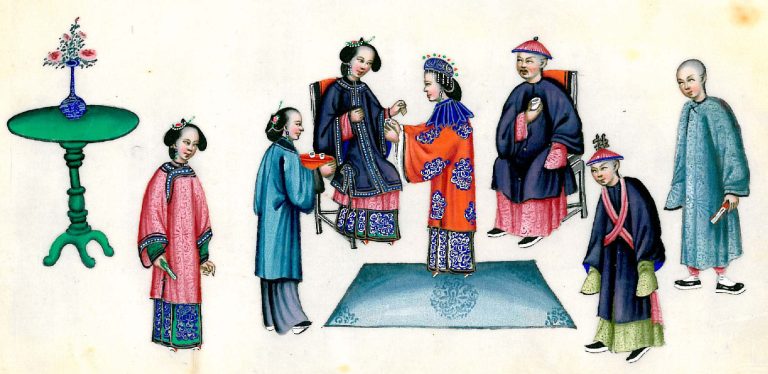Instructions for Chinese Women and Girls (Nǚ jiè 女誡) is an ancient Chinese guidebook for cultivating traditional feminine virtues. Written by polymath Ban Zhao (班昭), it addressed the need for girls to be educated in virtues, and quickly became a lasting reference for raising daughters in China for many dynasties to follow. This series focuses on the virtues of traditional women and their role in harmonizing family and society.
In ancient China, the relationship between husband and wife was the great foundation of all human relationships. Based on the harmony between yin and yang, the union between a man and a woman was believed to be divinely arranged. Therefore, honoring marriage vows was not only a social matter but also a spiritual duty.
In order to build a stable marriage, the ancients emphasized the cultivation of virtue and the diligent fulfillment of each party’s roles according to the laws of nature.
“The distinctive quality of the yang is rigidity; the function of the yin is yielding. Man is honored for strength; a woman is beautiful on account of her gentleness.”
Ban Zhao, Instructions for Chinese Women and Girls
In an orderly and rational marriage, the husband embodied the explicit strength of yang, which was to be tempered and balanced by the implicit gentleness of the wife’s yin nature. To this end, men received rigorous education from an early age not only to master the Six Arts — rites, music, archery, chariotry, calligraphy, and mathematics — but most importantly to develop the character of a gentleman as taught by Confucius.
Success
You are now signed up for our newsletter
Success
Check your email to complete sign up
With Ban Zhao’s instruction, women embraced their yin nature to become devoted and virtuous wives, and to cultivate a lasting marriage.
A predestined relationship
A Chinese proverb goes, “it takes one hundred years to cultivate a relationship for two to share a boat, and one thousand years for two to share a bed.” Marriage was not to be taken lightly as it shaped the lives of the two fortunate individuals.
After observing the appropriate rites and receiving the approval of both their parents, a wife would leave her father’s home to live with her husband, who would thereafter be her lifelong companion and nearest relative.

Winning the heart of one man was a woman’s blessing. Yet Ban Zhao discouraged women from using coyness and flattery to attract a husband. On the contrary, genuine modesty, devotion, and propriety in conduct were regarded as the direct path to a husband’s heart.
On harmony and balance
Ban Zhao spoke of acquiescence as the most refined characteristic of a wife. Paired with modesty, a woman’s acquiescence had the power to melt discord and maintain harmony.
A wife’s humble and tolerant character would balance and temper the husband’s dominant yang character. If both wanted to be dominant, or if both decided to be meek, decision making would be difficult and harmony would be lost. That is why, in traditional Chinese culture, the wife’s yielding nature makes her complementary — not inferior — to her husband. This allows families and society to thrive.
Embracing their yang nature, men would naturally make most decisions in the family and the wife would give her wholehearted support and cooperation. When the husband spoke, it was proper of a devoted wife to give careful attention. Should her husband make a mistake, the wife would gently persuade him to do the right thing rather than rebuking him.
In her book, Ban Zhao quoted some verses from the Classic of Changes (Yì Jīng 易經) to illustrate the harmony that ensues when husband and wife are in agreement:
Should two hearts harmonize,
The united strength can cut gold.
Words from hearts which agree,
Give forth fragrance like the orchid.
I Ching, or Book of Changes
Given the resilient and persevering nature of women, a wife’s natural predisposition would often be to provide emotional support and buffer her husband’s difficult emotions. If the husband was angry, his wife would not be angry in return, but would meekly yield to him; if the husband was sweet, his wife would be sweet as well. This way, a virtuous wife would nurture positive emotions and extinguish harmful ones.

Despite their contrasting natures, the relationship between husband and wife was based on mutual grace and love.
“The correct relationship between husband and wife is based upon harmony and intimacy, and conjugal love is grounded in proper union.
Ban Zhao, Instructions for Chinese Women and Girls
In ancient China, husband and wife treated each other as guests of honor, demonstrating that respect and politeness are the foundation of a solid and lasting marriage.
On being a caring wife
Because of their tender and attentive nature, women tend to express their devotion through acts of service. Thus, in most human societies and cultures, women have traditionally played the role of caregivers, ensuring that those around them, especially their closest relatives, have all their basic needs met. This is even more the case with her husband.
A virtuous wife would never neglect her husband’s welfare. To ensure his bodily health, she would carefully prepare his daily food, and see that his clothing was not only clean, but also suitable for the weather. If his garments became worn, she would mend them with care.
If the husband would be home late, a devoted wife would stay awake to await his arrival, keeping the light on and the food warm. If the husband fell ill, a solicitous wife would exhaust all means to restore him, administering medicines with a careful hand and raising prayers to Heaven for his prompt recovery.

When the husband passes away
According to traditional culture, husband and wife are partners for life. Thus, if the husband died, the wife would not think of marrying again, but continued to honor him during her lifetime.
Devote yourself to your husband’s family, reverence his parents and instruct his children. Carefully keep his grave and observe all sacrificial rites.
Ban Zhao, Instructions for Chinese Women and Girls
For over five thousand millenia, traditional Chinese women demonstrated that the meek and gentle feminine nature is actually a powerful force that fulfills and nurtures life itself. For a woman to embrace her yin nature does not mean that she is sacrificing or demeaning herself. On the contrary, it speaks of her willingness to follow Heaven’s will.
A closer look at the harmonious interaction between genders reveals that men and women are fundamentally different, yet complementary to each other. When people deviate from the natural way or struggle to change their role, harmony is lost and families crumble. But if each individual surrenders and adheres to his or her natural predisposition, marriages will be strong, families will prosper and society will thrive.
Note: The Ban Zhao quotes in this article are from Nancy Lee Swann’s English translation of Ban Zhao’s original work.
Click here for Part II: Ban Zhao’s Precepts for Women – Part II: Cultivating Politeness and Hospitality
Click here for Part IV: Ban Zhao’s Precepts for Women Part IV: On Early Rising













